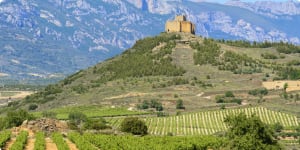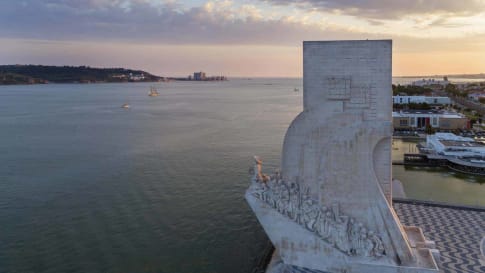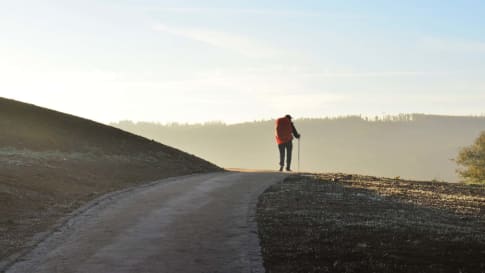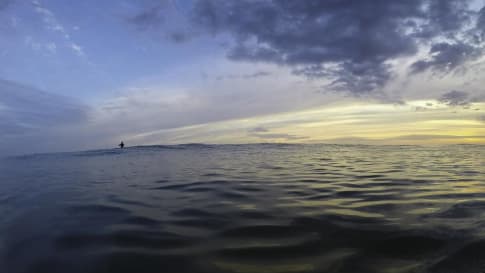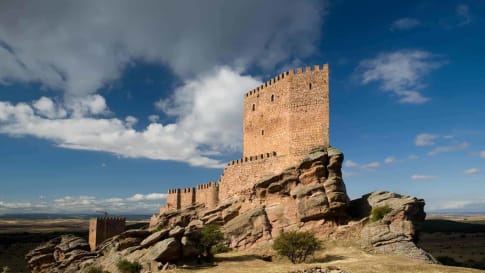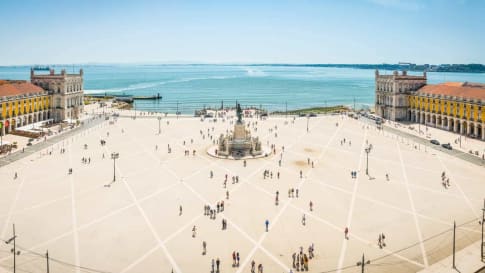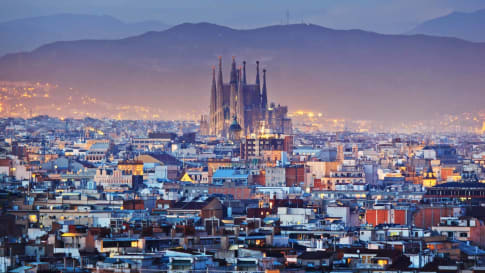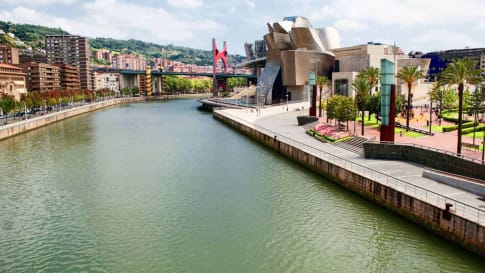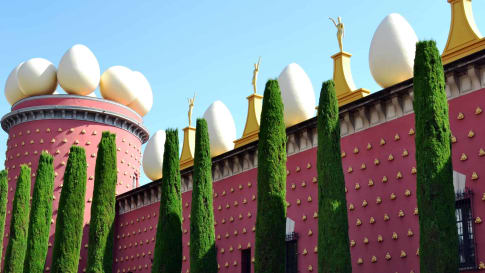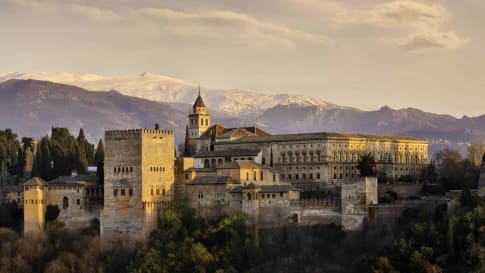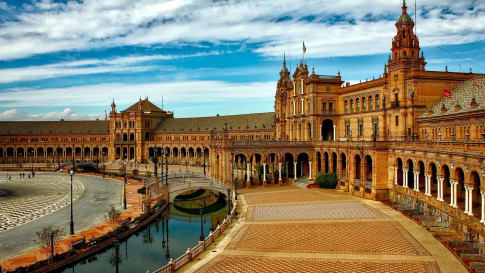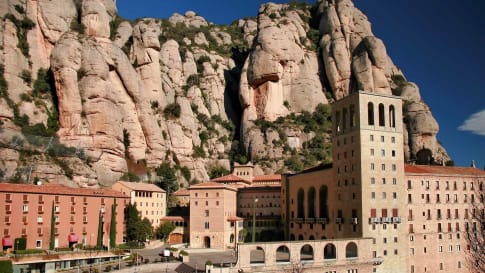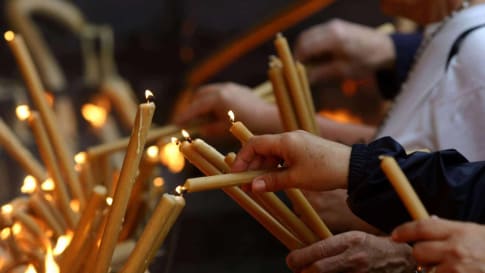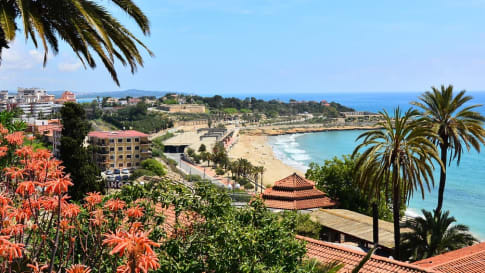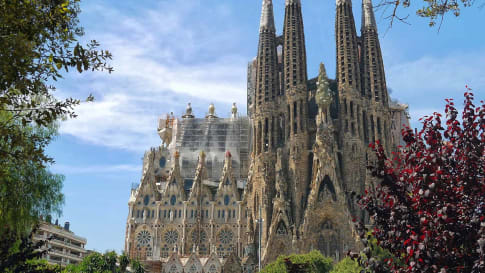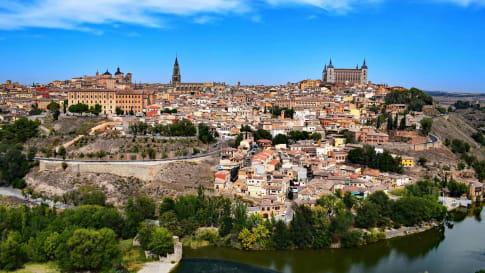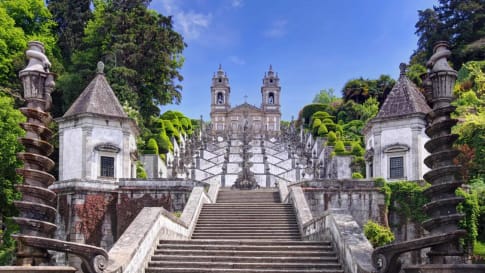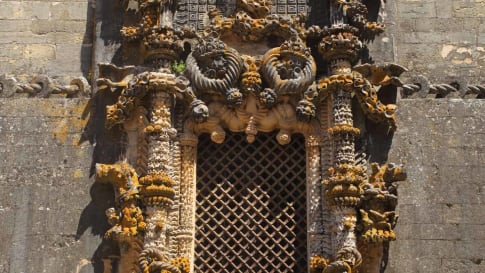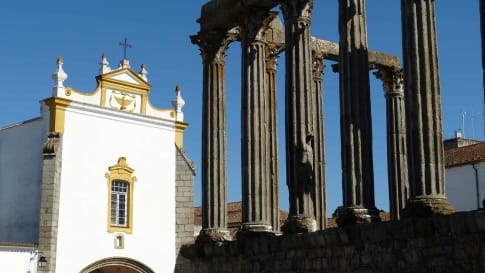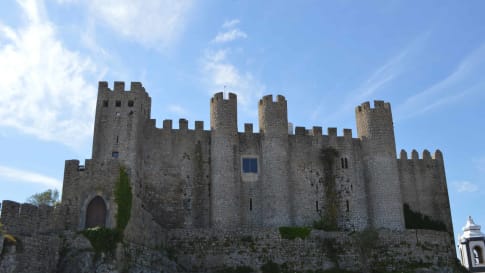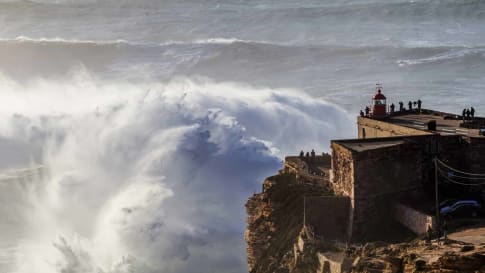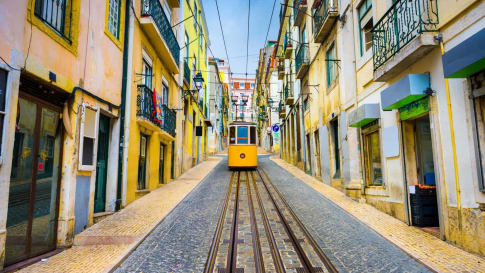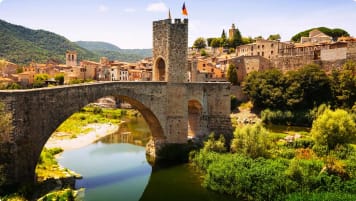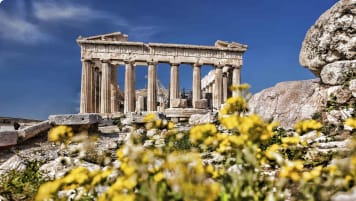Small Group Guided Tours of Spain and Portugal
Our program explores the lands of Spain and Portugal, two countries bound by many centuries of history reflected in their modern cultures. Divided by history and language, contiguous neighbours Spain and Portugal were once host to gigantic empires that still bear their languages and lifestyles. A small group tour for couple and solo travellers.
From A$16,225AUD
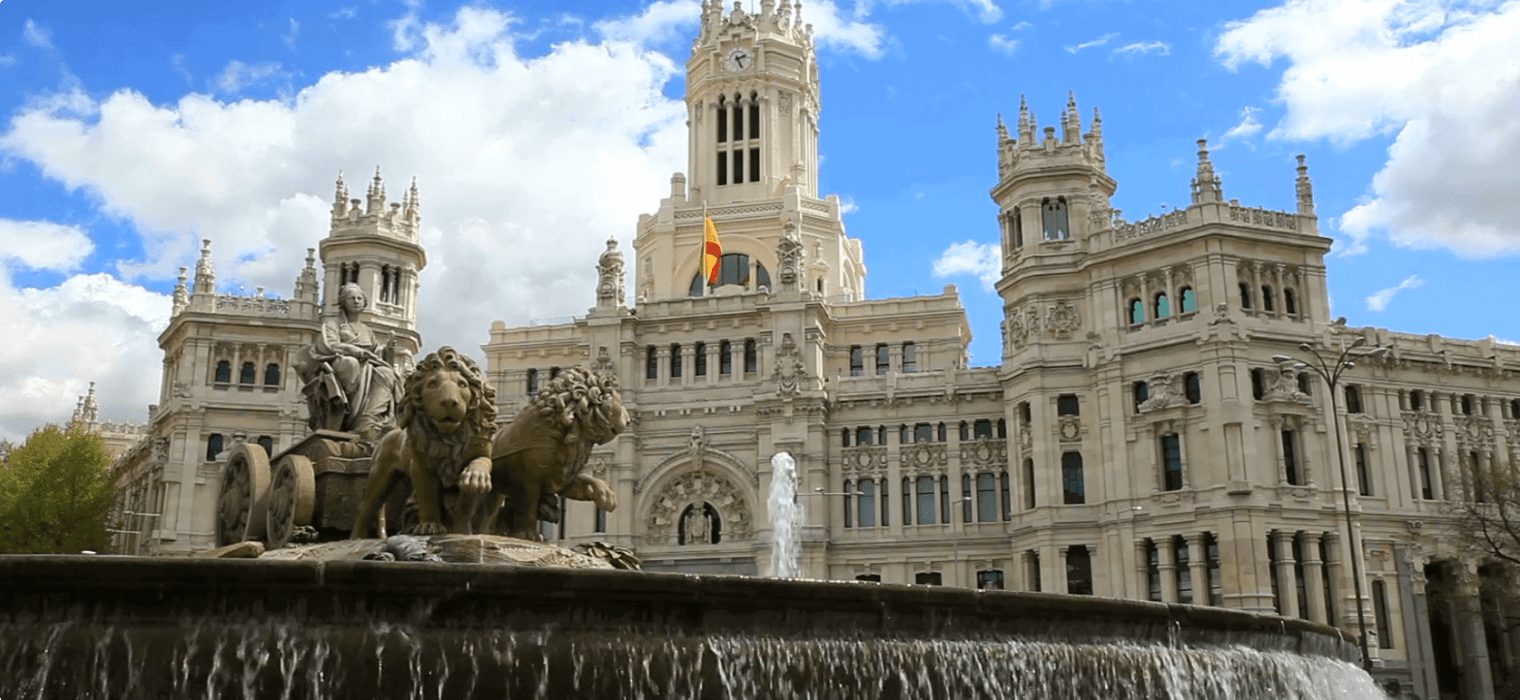
Highlights
- 1. Experience La Rioja, the mountain kingdom of Navarra, and neighbouring Basque Country with its astounding Guggenheim Museum.
- 2. Explore Toledo and Moorish cities of Cordoba, with its awe-inspiring “Mezquita,” and Granada, with its Alhambra Palace.
- 3. In Portugal, stay in the charming city of Braga, visit Oporto, and explore the historical capital, Lisbon.
- 4. Visit the stunning coastal areas surrounding Lisbon, including Europe's westernmost point.
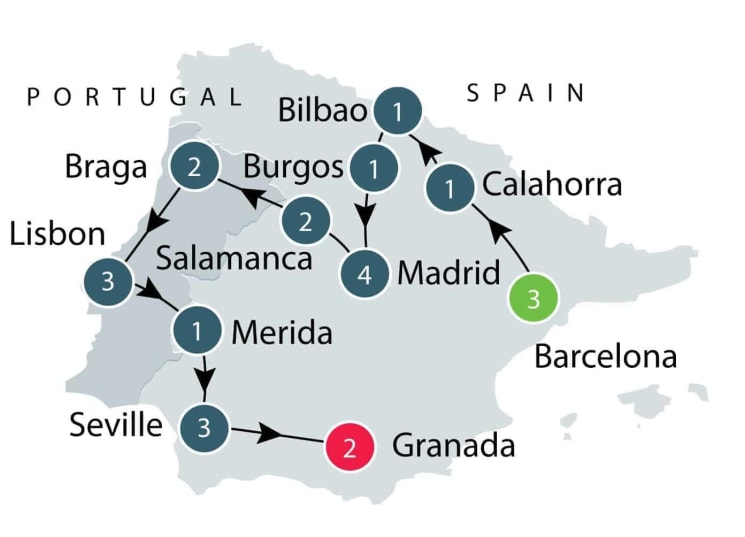
Departure Dates
| Departure Date | Price |
|---|---|
| 01 October 2024 Ends 24 October 2024 • 24 days A$16,225 Twin A$18,315 Single Available | Selected |
| 02 March 2025 Ends 25 March 2025 • 24 days A$17,035 Twin A$19,230 Single Available | |
| 01 April 2025 Ends 24 April 2025 • 24 days A$17,035 Twin A$19,230 Single Available | |
| 01 October 2025 Ends 24 October 2025 • 24 days A$17,035 Twin A$19,230 Single Available | |
| 01 March 2026 Ends 24 March 2026 • days A$17,035 Twin A$19,230 Single Available | |
| 31 March 2026 Ends 23 April 2026 • days A$17,035 Twin A$19,230 Single Available | |
| 07 October 2026 Ends 31 October 2026 • days A$17,035 Twin A$19,230 Single Available |
Spain and Portugal | Small Group Tours.
Odyssey offers easy, convenient, and relaxed escorted small group tours across Western Europe including Spain and Portugal. We explore Spain and Portugal fairy-tale natural beauty, its ancient Roman heritage, its World Heritage Sites, and world famous cities, all with some truly spectacular scenery along the way. This and more is all waiting to be explored on one of Odyssey’s small group tours of Spain and Portugal, designed for the senior traveller, and led by experienced, and enthusiastic like minded people.
Discover the Iberian peninsula on these fully escorted small Spain and Portugal tours, perfect for the single traveller or couple.
Although divided by history and language, these close neighbours once possessed mighty empires bringing them great wealth which they then used to create many of the monuments we admire today.
The Iberian Peninsula is renowned for the spectacular views of its scenery, its red wines of rioja , and exotic food. Our Spain and Portugal tour explores the Iberian peninsula 's intricate history and incredible art and architecture as we stroll and wander through its streets. These are small group package tours of Spain and Portugal for mature travellers, either couples or singles.
Itinerary & highlights of the Spain and Portugal tour
Small group tours Spain and Portugal is for senior and mature travellers who seek to learn whilst on a group tour. The itinerary of this small group tour spends 24 days exploring the Iberian peninsula with your tour manager. As expected this trip includes several famous historic destinations rich in Spanish culture on this escorted tour. Your experienced tour director leads the way assisted by local a tour guide for guided sightseeing in key places such as Madrid, Barcelona, Seville, Bilbao, Segovia, Braga and Lisbon ensuring you have a great trip.
This small group tour spends 24 days exploring several famous destinations. The tour commences in Spain in Barcelona , a highlight of which is the colourful Park Guell. As well as Barcelona's Sagrada familia Basilica. From Barcelona, the tour heads to northern Spain into Rioja and Basque country before reaching the northern industrial city and home to Europe's Guggenheim museum, Bilbao in Northern Spain. We leave Bilbao heading south to spend almost 6 days on a city tour in the Spanish capital, visiting the Royal Palace and other highlights. After Madrid the tour heads to Salamanca, a UNESCO World Heritage Site, and northwest into Portugal. We explore the Atlantic coast, and then on to Lisbon , the nation's historic capital. Leaving Portugal, the tour heads into Southern Spain to Seville and finally concludes in Granada.
This tour is fully escorted but also makes great use of a local tour guide and tour operator when appropriate whose knowledge enhances the program's highlights and your travel experiences on this group tour. Highlights include a visit to La Rioja, the mountain kingdom of Navarra, along with neighbouring Basque Country and the astounding Guggenheim Museum. We also take a guided tour of Braga , and wander the cobblestone streets of the capital of Portugal, Lisbon. The magnificent Moorish architecture left behind by the Moors in Seville and Granada will be another highlight of our Spain and Portugal tours.
On this tour of Spain and Portugal, in the evenings you can enjoy wine tasting, food at the tapas bars, and views of the mountains and other wondrous scenery.
Odyssey offers two departures a year, as well as an 11-day short version of the program. You can also combine this tour with our long stay program in Barcelona, an in-depth 22-day program exploring the city.
Odyssey's tours to Spain offered each year are popular package tours with travellers and typically operate every year.
You can learn more about both Spain and Portugal with our country profiles where all other tour departures are listed as well. For more details, click the 'Top 5' or 'Itinerary' buttons above! If you're keen to experience this tour, please call or send an email. Or, to book, simply fill in the form on the right hand side of this page.
Articles about Spain and Portugal tours
The following list of articles are either published by Odyssey Traveller for mature aged and senior travellers or carefully selected articles from external sources to maximise their knowledge and enjoyment of Spain & Portugal when visiting:
Gallery
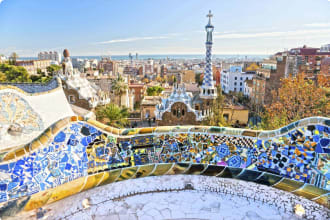

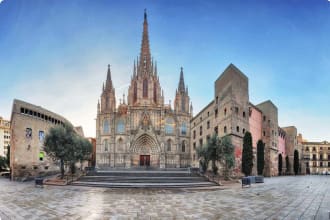
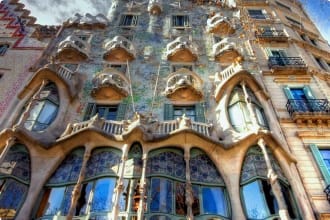
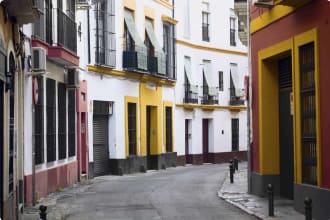
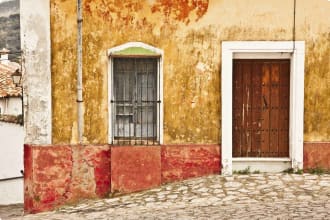
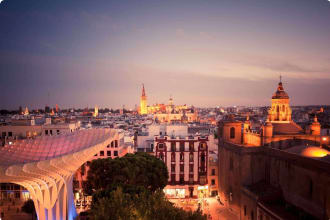
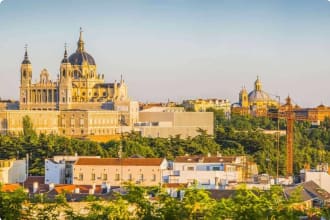
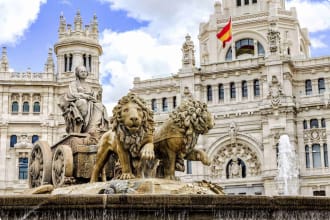
Itinerary
24 days
Day 1: Barcelona
Accommodation: 3 nights at Amister Hotel or similar.
Upon arrival in Barcelona, we will come to the hotel individually. Our Spain tour begins with an orientation and welcome dinner. (D)
Day 2: Barcelona
Accommodation: Amister Hotel or similar.
Today, we enjoy a full day tour around Barcelona, visiting the Miró Foundation, the National Museum of Catalan Art and Park Guell, a World Heritage Site since 1984 and located in the gothic quarter. The evening is free to relax or to discover one of the many local restaurants for dinner. (B).
Once part of the Aragonese Empire, Catalonia is now an autonomous Spanish province, proud of its distinctive language and culture. Stretching from the Mediterranean to the Pyrenees, it was here that the Romans first landed on the Iberian peninsula and founded a new “colonnia” on the site of a previous Carthaginian settlement, the area now forming Barcelona’s “Barri Gotic.” Catalonian heritage is a mixture of old and new as ancient churches and monuments vie for attention with the Modernist school of Gaudi and Dali. The Catalonian capital reflects this contrast with architecture ranging from its Gothic cathedral to Gaudi’s modernist Sagrada Familia.
Day 3: Barcelona
Accommodation: Amister Hotel or similar.
Today, we continue exploring this wonderful city with our local tour guide. We walk along the Paseo de Gracia and through the Barrio Gothic (gothic quarter) and then visit the Maritim Museum. There will be some free time for lunch at our own arrangements. Later we continue with our tour, with a guided visit of Palau de La Musica Catalana. We then enjoy a guided tour of the magnificent, though still unfinished, Sagrada Familia. Dinner tonight is at own arrangements.
(B)
Day 4: Barcelona - Calahorra
Accommodation: 1 night at Parador de Calahorra or similar.
After breakfast, we have a morning visit to the Picasso Museum. Thereafter, we head to the train station to catch the high speed AVE train to Zaragoza. The journey takes around 2 hours, and on arrival we’ll be transferred to our hotel. The remainder of the afternoon is free to explore the surrounding area. Dinner this evening is at our hotel.
(B,D)
Day 5: Calahorra - Bilbao
Accommodation: 1 night Silken Indautxu or similar.
This morning we will travel to Pamplona, a city made famous by its annual bull runs. We will meet our local guide for a tour of the city, exploring its rise from an army camp for the Roman general Pompey to the capital of the semi-autonomous Navarre region. After lunch at own arrangements, we carry on to Bilbao, (Basque country)where will have dinner at our hotel.
(B,D)
Day 6: Bilbao - Burgos
Accommodation: 1 night at Meson del Cid or similar.
This morning the group starts with a tour of the city of Bilbao, including a visit to the magnificent Guggenheim museum where we spend 2 to 3h viewing the collection of contemporary works of art. We will stop at Mercado de Ribera to get some lunch (own arrangements) before continuing on to Burgos. Most of this section of the tour today runs parallel to the Camino de Santiago, the Catherdral in Burgos is an important stop for those making the pilgrimage. We arrive at our hotel in Burgos in time for dinner.
(B,D)
Day 7: Burgos - Madrid
Accommodation: 4 nights at Quatro Puerta Del Sol or similar
We check out of our hotel this morning bound for the Spanish capital, Madrid. Before leaving Burgos, we meet our local tour guide for a walking tour this morning of the city’s highlights, including entrance to the cathedral. En route to Madridwe pause to stretch our legs and grab some lunch (at own arrangements). In Santo Domingo de la Calzada, we stop to view the spectacular Roman aqueduct. We arrive at our hotel in the late afternoon.
(B)
Day 8: Madrid
Accommodation: Quatro Puerta Del Sol or similar
This morning we meet our local tour guide for a full-day viewing and exploring the highlights of the Madrid, including entrance to the Royal Palace and “Museo Reina Sofia”; which is is Spain’s national museum of 20th-century art. In the evening, we meet up with a local guide who takes on a Tapas tour of the capital, where we will sample local cuisine across a series of bars. After a post-dinner walk to Mercado San Miguel, we return to our hotel.
(B,D)
Day 9: Madrid
Accommodation: Quatro Puerta Del Sol or similar
Today we join our local guide again in exploring the nearby city of Toledo on a walking tour. We will visit the Synagogue de Santa Maria la Blanca, Sante Tome Church, the cathedral and view the exterior of the Alcazar, before we return to Madrid for dinner at a local restaurant.
(B,D)
Day 10: Madrid
Accommodation: Quatro Puerta Del Sol or similar
This morning, we visit the Prado Museum with our local guide. The remainder of the day is free to enjoy the city at leisure.
(B)
Day 11: Salamanca
Accommodation: 2 nights at Hotel Grand Coronal Sol or similar
This morning we check out of our hotel bound for Salamanca. We pause first in El Escorial, where we visit the Royal Monastery. We continue on and pause to view the medieval walls in Avila before arriving at our hotel in Salamanca. Salamanca is probably best known for having the oldest university in Spain and one of the oldest in Europe. This university is still what gives a charming ambiance to the town. Hundreds of students pass through the narrow streets and enjoy the numerous and beautifully decorated cafes until late at night. This charming town is unrivalled in its architectural purity. In central areas all recent buildings are built in Salamanca’s best tradition. The city has been declared a UNESCO World Heritage Site. We have dinner at a local restaurant tonight.
(B,D).
Day 12: Salamanca
Accommodation: Hotel Grand Coronal Sol or similar.
We meet our local guide this morning and have a field trip taking in Salamanca’s main sights. We visit the old and new Cathedrals, the House of Shells (Casa de las Conchas) and the University. We have a free afternoon to continue to explore Salamanca at our own pace.
(B)
Day 13: Braga
Accommodation: 2 nights at Mercure Braga Centro or similar.
We check out of our hotel and depart for Portugal this morning. En route to Braga, we pause to explore Zamora. We arrive in Braga and check in to our hotel. Dinner tonight is at our hotel.
(B,D)
Day 14: Braga
Accommodation: Mercure Braga Centro or similar.
This morning, we meet our local guide for a full-day tour introducing us to Porto. We visit the cathedral and the Church of São Francisco. We stop in a local port lodge for a guided tour and tasting of port. En route back to Braga we pause to view the main sights of Guimarães. Dinner tonight is at leisure.
(B)
Day 15: Lisbon
Accommodation: 3 nights at Hotel Florida or similar.
We check out of our hotel this morning bound for the Portuguese capital. On the way we pause to explore Coimbra and arrive at Lisbon in time for dinner at a local restaurant.
(B,D)
Day 16: Lisbon
Accommodation: Hotel Florida or similar.
This morning we meet our local guide for a half-day tour of Lisbon including entrance to the Royal Carriage Museum. The afternoon and evening are free for you to explore the city at leisure.
(B)
Day 17: Lisbon
Accommodation: Hotel Florida or similar.
Today we explore the coastal areas surrounding Lisbon. We travel first to Estoril and then on to Cascais. We pause in Cabo de Roca, to view Europe’s westernmost point, and also stop in Sintra where we pause for lunch (own arrangements). We carry on to Queluz to visit the Royal Palace and gardens before returning to Lisbon. Tonight we have dinner at a local restaurant where we are exposed to the traditional Portuguese art-form of the fado in an evening performance.
(B,D)
Day 18: Merida
Accommodation: 1 night at Hotel Velada Merida or similar.
We leave the Portuguese capital today as we travel to Mérida. En route we pause in Badajoz. Upon our arrival in Mérida, we meet our local guide and have a city tour during which we visit the Roman theatre, the amphitheatre, the Casa del Mitreo, and the National Museum of Roman Art. We have dinner at our hotel tonight.
(B,D)
Day 19: Seville
Accommodation: 3 nights at Hotel Sevilla Macarena or similar.
We depart Mérida for Seville this morning. We pause in Aracena with time to explore the town at our own pace and get some lunch (own arrangements). We arrive in Seville late afternoon.
(B)
Day 20: Seville
Accommodation: Hotel Sevilla Macarena or similar.
This morning, we meet our local guide for a tour that takes in the highlights of Seville. On our tour, we will visit the Alcazar, the cathedral, the Treasury and Giralda. We will also walk through the Barrio de Santa Cruz. This afternoon is free for us to explore at leisure, and in the evening we will attend a flamenco show with a tapas dinner.
(B,D)
Day 21: Seville
Accommodation: Hotel Sevilla Macarena or similar.
Today we explore Jerez de la Fronterra on foot, where we will visit a sherry bodega for a tour and tasting. We then continue to Cadiz to view the city on our own, before returning to Seville.
(B)
Day 22: Granada
Accommodation: 2 nights at Barcelo Carmen Hotel or similar.
We check out of our hotel this morning bound for Granada. En route we meet a local guide in Cordoba where we are introduced to the highlights of the city. Our guide will take us to the Mezquita and Tower, the beautiful Mosque of Córdoba, before we continue on to Granada.
(B)
Day 23: Granada
Accommodation: Barcelo Carmen Hotel or similar.
We meet our local guide this morning and begin our exploration of Granada. We view the main sights of the city and visit the Royal Chapel (Capilla Real). We then enter the magnificent Alhambra Palace and the Generalife Gardens. The remainder of the afternoon is free for you to explore Granada at leisure. We come together this evening for our farewell dinner in a local restaurant.
(B,D)
Day 24: Granada
After breakfast, the tour will end today in Granada. (B)
Tour Notes
- Group size is limited to a maximum of 16 participants.
Includes / Excludes
What’s included in our Tour
- 23 nights of hotel accommodation.
- 23 breakfasts and 13 dinners.
- Applicable entry fees and services of local guides.
- Touring by comfortable and modern coach.
- Field trips as indicated.
- Gratuities and necessary tips.
- Services of an Odyssey program leader.
- Detailed tour information booklet.
What’s not included in our Tour
- Return international airfare and departure taxes.
- Comprehensive international travel insurance.
- Items of a personal nature such as telephone calls and laundry.
- Meals not specified in the itinerary.
Participants must be able to carry their own luggage, climb and descend stairs, be in good health, mobile and able to participate in 3-5 hours of physical activity per day, the equivalent of walking / hiking up to 8 kilometers per day on uneven ground.
Book now
Make it a private tour
Easing your journey
Crossing international borders with restrictions
The list of requirements to travel internationally has changed and will continue to change for several years. Odyssey is here to assist you in managing your way through these requirements:
For more information see our Crossing international borders with restrictions page.
Book With Confidence
If less than 30 days before your tour starts you are unable to travel as a result of Government travel restrictions, Odyssey Traveller will assist you with a date change, provide you with a credit or process a refund for your booking less any non-recoverable costs.
See Terms and conditions for details.
Peace of Mind Travel
The safety of our travellers, tour leader, local guide and support staff has always been our top priority and with the new guidelines for public health and safety for keeping safe for destinations around the world, we’ve developed our plan to give you peace of mind when travelling with us.
See Peace of Mind Travel for details.
Reviews
This was by far the 'best' Tour I've experienced both with Odyssey and with other companies - small, pleasant group etc. The tour guidelines, itinerary etc were the best I've had in comparison to other tours. I particularly liked the graph of the expected weather in Spain and Portugal (makes packing easier). I'm a vegetarian and know that in a tour such as ours providing food for me can be fraught. Almost without exception the restaurant/hotel meals were worthy of a 5 star restaurant. My meals always met the five food group criteria and were beautifully presented - we even photographed some! The restaurants even managed vegetarian tapas! Carol T. May '19
This was a wonderful tour, crammed with experiences of Spain and Portugal, and all delivered apparently with the greatest ease. Well done! John M. May '19
Great small mature travellers tour. Well organised, great hotels , lovely food, local knowledgeable guides showed us around their towns. With entry included to the majority of sites. A comfortable small coach so the fourteen of us had plenty of room but we weren’t in a massive coach. It wasn’t really like the other tours following someone with a flag. We were more like a group of friends out exploring. Lesley and Ken S. May '19
I like Odyssey - it provides small groups where you can get to know one another. Angela L. Sep '18
This tour was really wonderful in its scope of meeting Spanish and Portuguese culture and history. Being able to link it in with my previous European travels was very meaningful to me. I was totally impressed by every aspect of the tour. Participant May 2018
Cannot speak too highly of our tour director, Stephan De Roeck. Stephan's local knowledge, command of the language, care for our welfare and unfailing good humour made everyone feel special. Participant May 2018
A wonderful experience. learnt a lot and enjoyed everything. The trip covered the places that i have wanted to see in Spain and Portugal. Participant May 2018
Reading List Download PDF
Spain: The Centre of the World 1519-1682
Robert Goodwin
n the sixteenth century, the Spaniards became the first nation in history to have worldwide reach; across most of Europe to the Americas, the Philippines, and India. Goodwin tells the story of Spain and the Spaniards, from great soldiers like the Duke of Alba to literary figures and artists such as El Greco, Velázquez, Cervantes, and Lope de Vega, and the monarchs who ruled over them.
At the beginning of the modern age, Spaniards were caught between the excitement of change and a medieval world of chivalry and religious orthodoxy, they experienced a turbulent existential angst that fueled an exceptional Golden Age, a fluorescence of art, literature, poetry, and which inspired new ideas about International Law, merchant banking, and economic and social theory.
The Moor's Last Stand: How Seven Centuries of Muslim Rule in Spain Came to an End
Elizabeth Drayson
The Moor's Last Stand presents the poignant story of Boabdil, the last Muslim king of Granada. Betrayed by his family and undermined by faction and internal conflict, Boabdil was defeated in 1492 by the forces of King Ferdinand and Queen Isabella of the newly united kingdoms of Castile and Aragon. The Christian victory marked the completion of the long Christian reconquest of Spain and ended seven centuries in which Christians, Muslims and Jews had, for the most part, lived peacefully and profitably together. Five centuries after his death, Boabdil continues to be a potent symbol of resistance to the forces of western Christendom, and his image endures in contemporary culture.
Elizabeth Drayson presents a vivid account of Boabdil's life and times and considers the impact of his defeat then and now.
Moorish Spain
Richard A. Fletcher
Written in the same tradition as John Julius Norwich's engrossing accounts of Venice and Byzantium, Richard Fletcher's Moorish Spain entertains even as it enlightens. He tells the story of a vital period in Spanish history which transformed the culture and society, not only of Spain, but of the rest of Europe as well. Moorish influence transformed the architecture, art, literature and learning, and Fletcher combines this analysis with a crisp account of the wars, politics and sociological changes of the time.
Beginning in the year 711 and continuing for nearly a thousand years, the Islamic presence survived in Spain, at times flourishing, and at other times dwindling into warring fiefdoms. But the culture and science thereby brought to Spain, including long-buried knowledge from Greece, largely forgotten during Europe’s Dark Ages, was to have an enduring impact on the country as it emerged into the modern era. In this gracefully written history, Richard Fletcher reveals the Moorish culture in all its fascinating disparity and gives us history at its best: here is vivid storytelling by a renowned scholar.
The Revolution and Civil War in Spain
Pierre Broue, Emile Temine
An outstanding history that shows how a promising workers' movement ended in a fascist victory. What emerges most clearly in this detailed and long out of print history, is how the popular front held back radical measures that would have galvanised the working class and peasant base of the revolution, and decisively weakened Franco's forces. Author Pierre Broue way for many years a professor of contemporary history at the Institut d'Etudes politiques in Grenoble, and was a world-renowned specialist on the Communist and international workers' movements.
Homage to Catalonia
George Orwell
Because this war book is really about frustration as Orwell battles Fascism in Spain and takes a bullet in the throat for his troubles.
Four Princes: Henry VIII, Francis I, Charles V, Suleiman the Magnificent and the Obsessions that Forged Modern Europe
John Julius Norwich
'Never before had the world seen four such giants co-existing. Sometimes friends, more often enemies, always rivals, these four men together held Europe in the hollow of their hands.'
Four great princes - Henry VIII of England, Francis I of France, Charles V of Spain and Suleiman the Magnificent - were born within a single decade. Each looms large in his country's history and, in this book, John Julius Norwich broadens the scope and shows how, against the rich background of the Renaissance and destruction of the Reformation, their wary obsession with one another laid the foundations for modern Europe. Individually, each man could hardly have been more different - from the scandals of Henry's six wives to Charles's monasticism - but, together, they dominated the world stage.
From the Field of the Cloth of Gold, a pageant of jousting, feasting and general carousing so lavish that it nearly bankrupted both France and England, to Suleiman's celebratory pyramid of 2,000 human heads (including those of seven Hungarian bishops) after the battle of Mohács; from Anne Boleyn's six-fingered hand (a potential sign of witchcraft) that had the pious nervously crossing themselves to the real story of the Maltese falcon, Four Princes is history at its vivid, entertaining best.
With a cast list that extends from Leonardo da Vinci to Barbarossa, and from Joanna the Mad to le roi grand-nez, John Julius Norwich offers the perfect guide to the most colourful century the world has ever known and brings the past to unforgettable life.
Ghosts of Spain: Travels Through a Country's Hidden Past
Giles Tremlett
The Spanish are reputed to be amongst Europe's most voluble people. So why have they kept silent about the terrors of the Spanish Civil War and the rule of dictator Generalissimo Francisco Franco?
The appearance - sixty years after that war ended - of mass graves containing victims of General Franco's death squads has finally broken what Spaniards call 'the pact of forgetting'. At this charged moment, Giles Tremlett embarked on a journey around Spain - and through Spanish history.
As well as a moving exploration of Spanish politics, Tremlett's journey was also an attempt to make sense of his personal experience of the Spanish. Why do they dislike authority figures, but are cowed by a doctor's white coat? How had women embraced feminism without men noticing? What binds gypsies, jails and flamenco? Why do the Spanish go to plastic surgeons, donate their organs, visit brothels or take cocaine more than other Europeans?
'Lively and well-informed . . . at once a history, a journalistic inquiry and a travel book.' Sunday Telegraph
The Portuguese
Barry Hatton
Portugal is an established member of the European Union, one of the founders of the euro currency and a founder member of NATO. Yet it is an inconspicuous and largely overlooked country on the continent’s south-west rim.
In the fifteenth- and sixteenth-century Age of Discovery the Portuguese led Europe out of the Mediterranean into the Atlantic and they brought Asia and Europe together. Evidence of their one-time four-continent empire can still be felt, not least in the Portuguese language which is spoken by more than 220 million people from Brazil, across parts of Africa to Asia.
Analyzing present-day society and culture, The Portuguese also considers the nation’s often tumultuous past. The 1755 Lisbon earthquake was one of Europe’s greatest natural disasters, strongly influencing continental thought and heralding Portugal’s extended decline. The Portuguese also weathered Europe’s longest dictatorship under twentieth-century ruler António Salazar. A 1974 military coup, called the Carnation Revolution, placed the Portuguese at the centre of Cold War attentions. Portugal’s quirky relationship with Spain, and with its oldest ally England, is also scrutinized.
Portugal, which claims Europe’s oldest fixed borders, measures just 561 by 218 kilometres . Within that space, however, it offers a patchwork of widely differing and beautiful landscapes. With an easygoing and seductive lifestyle expressed most fully in their love of food, the Portuguese also have an anarchical streak evident in many facets of contemporary life. A veteran journalist and commentator on Portugal, the author paints an intimate portrait of a fascinating and at times contradictory country and its people.
The Ornament of the World: How Muslims, Jews, and Christians Created a Culture of Tolerance in Medieval Spain
Maria Rosa Menocal
A brilliant and fascinating portrait of medieval Spain explores the golden age when Muslims, Jews, and Christians lived together in an atmosphere of tolerance
Journey to Portugal: In Pursuit of Portugal's History and Culture
Jose Saramago
When José Saramago decided to write a book about Portugal, his only desire was that it be unlike all other books on the subject, and in this he has certainly succeeded. Recording the events and observations of a journey across the length and breadth of the country he loves dearly, Saramago brings Portugal to life as only a writer of his brilliance can. Forfeiting the usual sources such as tourist guides and road maps, he scours the country with the eyes and ears of an observer fascinated by the ancient myths and history of his people. Whether it be an inaccessible medieval fortress set on a cliff, a wayside chapel thick with cobwebs, or a grand mansion in the city, the extraordinary places of this land come alive.
Always meticulously attentive to those elements of ancient Portugal that persist today, he examines the country in its current period of rapid transition and growth. Journey to Portugal is an ode to a country and its rich traditions.
Conquerors: How Portugal Forged the First Global Empire
Roger Crowley
In Empires of the Sea and City of Fortune, New York Times bestselling author Roger Crowley established himself as our generation’s preeminent historian of the great European seafaring empires, and the go-to author for post-Crusade clashes of East and West. Now, in Conquerors, Crowley gives us the epic story of the emergence of Portugal, a small, poor nation that enjoyed a century of maritime supremacy thanks to the daring and navigational skill of its explorers—a tactical advantage no other country could match. Portugal’s discovery of a sea route to India, campaign of imperial conquest over Muslim rulers, and domination of the spice trade would forever disrupt the Mediterranean and build the first global economy.
Crowley relies on letters and eyewitness testimony to tell the story of tiny Portugal’s rapid and breathtaking rise to power. Conquerors reveals the Império Português in all of its splendor and ferocity, bringing to life the personalities of the enterprising and fanatical house of Aviz. Figures such as King Manuel “the Fortunate,” João II “the Perfect Prince,” marauding governor Afonso de Albuquerque, and explorer Vasco da Gama juggled their private ambitions and the public aims of the empire, often suffering astonishing losses in pursuit of a global fortune. Also central to the story of Portugal’s ascent was its drive to eradicate Islamic culture and establish a Christian empire in the Indian Ocean. Portuguese explorers pushed deep into the African continent in search of the mythical Christian king Prester John, and they ruthlessly besieged Indian port cities in their attempts to monopolize trade.
The discovery of a route to India around the horn of Africa was not only a brilliant breakthrough in navigation but heralded a complete upset of the world order. For the next century, no European empire was more ambitious, no rulers more rapacious than the kings of Portugal. In the process they created the first long-range maritime empire and set in motion the forces of globalization that now shape our world. At Crowley’s hand, the complete story of the Portuguese empire and the human cost of its ambition can finally be told.
Iberia
James Michener
Spain is an immemorial land like no other, one that James A. Michener, the Pulitzer Prize–winning author and celebrated citizen of the world, came to love as his own. Iberia is Michener’s enduring nonfiction tribute to his cherished second home. In the fresh and vivid prose that is his trademark, he not only reveals the celebrated history of bullfighters and warrior kings, painters and processions, cathedrals and olive orchards, he also shares the intimate, often hidden country he came to know, where the congeniality of living souls is thrust against the dark weight of history. Wild, contradictory, passionately beautiful, this is Spain as experienced by a master writer.
A Concise History of Spain
William D. Phillips Jr and Carla Rahn Phillips
The rich cultural and political life of Spain has emerged from its complex history, from the diversity of its peoples, and from continual contact with outside influences. This book traces that history from prehistoric times to the present, focusing particularly on culture, society, politics, and personalities. Written in an engaging style, it introduces readers to the key themes that have shaped Spain's history and culture. These include its varied landscapes and climates; the impact of waves of diverse human migrations; the importance of its location as a bridge between the Atlantic and the Mediterranean and Europe and Africa; and religion, particularly militant Catholic Christianity and its centuries of conflict with Islam and Protestantism, as well as debates over the place of the Church in modern Spain. Illustrations, maps, and a guide to further reading, major cultural figures, and places to see, make the history of this fascinating country come alive.
Spain: A Literary Companion
Jimmy Burns
Spain has one of the richest cultures in the world - and one that has inspired writers throughout history.
Anyone visiting the country will want to know more about its literary heritage.
Jimmy Burns's 'Spain: A Literary Companion' is the perfect travel partner, a book that will open your eyes and allow you to view the country afresh - and introduce you to aspects of Spanish life you never knew existed.
Part personal travelogue, part anthology, this literary companion will surprise, entertain and, on occasion, move the reader.
It is a wide-ranging and incisive portrait of a country and its people: starting with the Roman poets, it journeys through Cervantes to Orwell and Hemingway.
Highlights include: the enduring nature of regional identity; the joys - and pitfalls - of Spanish food and wine; tributes to Spain's three cultures - Christian, Jewish and Muslim; the passions of flamenco and bullfighting; battlefield experiences from Wellington to the Civil War; and the changes to the country wrought by tourism.
"A fascinating portrait of a country that writers have always loved' - Robert Avon, best-selling author of 'Diary of an Angel'.
Jimmy Burns is an award winning journalist and author. His books include the internationally acclaimed 'Hand of God: The Life of Diego Maradona' and 'Barca: A People's Passion'. Born in Madrid, he has reported for the Financial Times, London Observer, BBC and the Economist, and was the FT correspondent in South America in the early 80s and his book on Argentina and the Falklands War, 'The Land That Lost Its Heroes', won the 1988 Somerset Maugham Award for non-fiction.
A Short History of Spain
Mary Platt Parmele
The history of Spain dates back to the Early Middle Ages. In 1516, Habsburg Spain unified a number of disparate predecessor kingdoms; its modern form of a constitutional monarchy was introduced in 1813, and the current democratic constitution dates to 1978. After the completion of the Reconquista, the kingdoms of Spain were united under Habsburg rule in 1516. At the same time, the Spanish Empire began to expand to the New World across the ocean, marking the beginning of the Golden Age of Spain, during which, from the early 1500s to the 1650s, Habsburg Spain was among the most powerful states in Europe.
Written in an engaging style, Mary Parmele’s concise study A Short History of Spain introduces readers to the key themes that have shaped modern Spain.
The New Spaniards
John Hooper
A fully revised, expanded and updated edition of this masterly portrayal of contemporary Spain.
The restoration of democracy in 1977 heralded a period of intense change that continues today. Spain has become a land of extraordinary paradoxes in which traditional attitudes and contemporary preoccupations exist side by side. Focussing on issues which affect ordinary Spaniards, from housing to gambling, from changing sexual mores to rising crime rates. John Hooper's fascinating study brings to life the new Spain of the twenty-first century.
Spain
Jan Morris
Passionate, evocative and beautifully written, Spain is a companion to the country: its people, its history - and its character. First published in 1964 and no less compelling today, Jan Morris's classic work is back in print, bringing Spain, its glory and its tragedy, vividly to life.
Jan Morris's collection of travel writing and reportage spans over five decades and includes such titles as Venice, Coronation Everest, Hong Kong, Spain, Manhattan '45, A Writer's World and the Pax Britannica Trilogy. Hav, her novel, was shortlisted for the Booker Prize and the Arthur C. Clarke Award.
'The most evocative book ever written about Spain.' Independent
